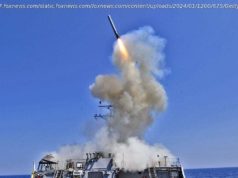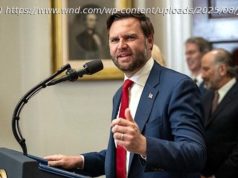President Trump has directed his military advisers to create a sixth military branch devoted to the cosmos, but doing so may require an act of Congress.
At about 8 a.m. on Monday, reporters called into a press conference with White House officials to discuss the day’s main event: a meeting of the National Space Council at noon. The conference was convened to discuss a spate of new proposals by the administration for, among other things, improving management of satellite traffic and cleaning up debris in Earth’s orbit. Not exactly thrilling stuff.
And so reporters went into the meeting ready to hear what had been outlined for them, without expectations for anything more exciting.
Then the president took the lectern.
“When it comes to defending America, it is not enough to merely have an American presence in space. We must have American dominance in space,” Trump said. “I’m hereby directing the Department of Defense and Pentagon to immediately begin the process necessary to establish a space force as the sixth branch of the Armed Forces. That’s a big statement. We are going to have the Air Force and we are going to have the Space Force—separate but equal. It’s going to be something.”
The president then singled out the man for this job. “General Dunford, if you would carry that assignment out, I would be very greatly honored,” Trump said, turning around to look for Joseph Dunford, the chairman of the Joint Chiefs of Staff, behind him. “Where’s General Dunford? General? Got it? Let’s go get it, general.”
Despite this enthusiastic proclamation, there was no mention of a space force in the space-policy directive the president signed on Monday. So what exactly is Trump saying when he directs Dunford to go forth, to “go get it”?
“It’s unclear to me exactly what he’s directing,” said Richard Wolf, the director of the Air Force Historical Support Division. “It’s always going to be subject to interpretation by the various agencies involved. You never know whether he’ll just forget about it or if he’ll actually carry it out.”
Trump has been talking about establishing a new military branch for space for several months now. The proposed branch would assume the responsibility for military space operations, which currently fall under the purview of the Air Force and some other agencies. The concept usually comes up when the president’s eyes stray from the teleprompter and he starts ad-libbing. He’s even described it as something that came to mind quite suddenly. “I was saying it the other day—’cause we’re doing a tremendous amount of work in space—I said, maybe we need a new force. We’ll call it the Space Force,” Trump said during a speech in March. “And I was not really serious. And then I said, what a great idea. Maybe we’ll have to do that. That could happen.”
It’s not clear whether Trump’s military advisers will actually establish what would be the newest military branch in about 70 years. But if they did, how would they do it?
A straightforward answer is surprisingly elusive, particularly because all five of the armed forces—Army, Navy, Marine Corps, Air Force, and Coast Guard—formed under different circumstances, not to mention completely different eras. The Army and Navy, for example, were enshrined in the Constitution. The law that established the Air Force reshuffled the country’s defenses in response to World War II. The forces that shaped these services are no longer relevant today.
Wolf was thinking about this question when I called him on Monday. Not long after the president’s rather surprising decree that day, the Air Force’s office of the chief of staff asked Wolf to dig into the country’s history and find out how the United States did it last time: in 1947, with the Air Force. “Things happen quickly sometimes,” Wolf said, dryly.
This is not a feasibility study, Wolf said. The United States hasn’t thought about establishing a new military branch in some time; they could use a refresher. “They just want to know: How did we do it? Who did it? How did they organize?” he said.
During World War I, military aviation operations were carried out by the U. S. Army. After the war, aviators started chafing at their Army management. “It was a growing realization that the people who governed them within the Army didn’t understand what aviators did and why they needed things that were different from the Army,” Wolf said. “The Army is pretty conservative when it comes to changing things, and the aviators were very forthright about wanting to change.”
Politicians in Congress heard them. Between 1926 and 1933, lawmakers introduced 29 unsuccessful bills that sought to grant air operations more freedom outside of the Army, according to Jeffery S. Underwood’s The Wings of Democracy: The Influence of Air Power on the Roosevelt Administration. Their wish came true in 1947, when the National Security Act, passed by Congress and signed into law by President Harry Truman, reorganized much of the country’s war infrastructure and funneled all air operations into a stand-alone division.
Like the Air Force, a Space Force would require action by Congress to exist. “One would assume that’s how [Trump] would ordinarily handle it,” Wolf said. But “this is no ordinary president. So you can’t say that’s how it will happen, but that’s how it has happened in the past.”
The concept of an armed service dedicated to space first emerged in earnest in 2000, as a recommendation from a military-reform commission led by Donald Rumsfeld, but was quickly forgotten after 9/11. It reappeared in earnest last June, when House lawmakers proposed legislation that would direct the Defense Department to create a “space corps” as a new military service inside the Air Force. The proposed agency would absorb the responsibilities of the U. S. Air Force Space Command, a unit inside the Air Force that supports most of the country’s military operations in space. “The military has not done a good enough job looking after space with all its other distracting priorities,” Representative Jim Cooper, a Tennessee Democrat, argued at the time.
The Pentagon groaned in response. “The Pentagon is complicated enough,” Heather Wilson, the Air Force secretary, told reporters . “This will make it more complex, add more boxes to the organization chart, and cost more money. If I had more money, I would put it into lethality, not bureaucracy.”
The House measure to create a space corps eventually failed, though the bill’s supporters remain optimistic—especially because of Trump’s support. Pentagon officials, meanwhile, have stayed mum about the idea, wary of publicly disagreeing with their commander-in-chief.






